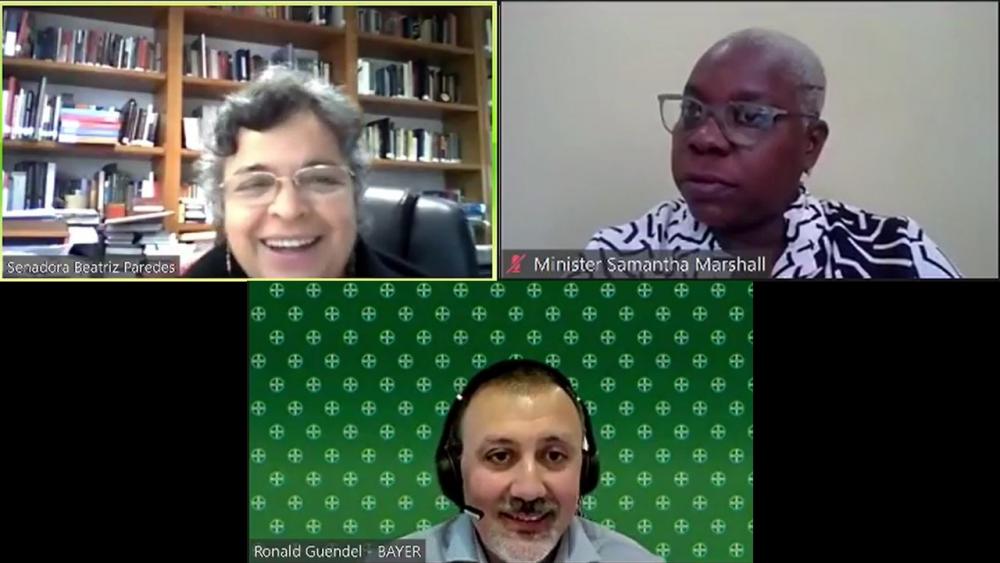Bridging the digital divide and accelerating connectivity in rural areas: urgent tasks for the development of Latin America and the Caribbean

San Jose, 17 February 2021 (IICA) – Bringing the latest technology to the countryside, providing rural dwellers with training in the use of tools, guaranteeing quality Internet connection, ensuring equitable Internet access and making technological equipment affordable are the main challenges Latin America and the Caribbean will need to overcome in order to bridge the digital divide.
This was the conclusion reached by international experts during the first session of the virtual hemispheric forum “Bridging the digital divide in rural areas of Latin America and the Caribbean: Towards a digital agricultural revolution”, organized by the Inter-American Institute for Cooperation on Agriculture (IICA), entitled “Digital divide: Importance, challenges and opportunities”. The digital divide was also identified as a key issue that should be addressed ahead of the United Nations Food Systems Summit.
“We need to encourage youth to develop solutions that are tailored to our countries and that will protect our ancestral knowledge while incorporating technologies to increase productivity”, stated Samantha Marshall, Minister of Agriculture, Fisheries and Barbuda Affairs in the government of Antigua and Barbuda.
“Historically, limited resources and attention have been provided to rural areas. To unlock their potential, we need these technologies to reach those areas. Opportunities like this one, which enable experts, policymakers and specialists to come together, give us hope of bridging these gaps little by little”, she remarked.
The panelists agreed that technological advances will not have a major impact unless people possess the necessary knowledge and economic resources to take full advantage of their potential. To this end, it is necessary to develop public policies that foster the inclusion of rural communities in the digital revolution, funding strategies, and linkages with the business and academic sectors.
Mexican senator and IICA Goodwill Ambassador for Sustainable Development and Social Equity, Beatriz Paredes, cited recent studies that demonstrate the need to transform our region’s reality.
According to the study “Rural Connectivity in Latin America and the Caribbean – A Bridge to Sustainable Development During a Pandemic”, carried out by IICA with support from Microsoft and the Inter-American Development Bank (IDB), 77 million people in Latin America and the Caribbean lack quality connectivity. Furthermore, the connectivity index in rural schools is around 15% and rural women are the least connected segment of society.
“The study conducted by IICA, IDB and Microsoft provides key input for the analysis of such a relevant issue, because half of Latin American and Caribbean countries do not have specific ways of measuring connectivity in rural areas. The limited data that is available does not differentiate between rural and urban areas; the digital gap requires increased efforts”, stated Senator Paredes.
The forum participants highlighted the need to better align agricultural development policies and plans with those related to digitalization, as a way to bridge the digital divide.
They also underscored the importance of empowering local organizations so that, together, they can broaden access to information, reduce infrastructure costs, improve funding conditions and play a leading role in adapting solutions to their own reality.
Ronald Guendel, Global Head of Food Security at Bayer, noted that “the region urgently needs more resilient food systems, cooperation that transcends borders to close gaps, new academic plans that include digital skills, and a larger digital movement”.
“If we combine private sector technologies with the public sector structure, we can deploy new technologies in agriculture. Bayer is committed to rural areas in Latin America and the Caribbean and the rest of the world. We are implementing a strategy to empower and train 100 million farmers on the planet”, stated Guendel, who served as the moderator during the event.
Also participating in the first session of the forum were Pablo Palacios, Program Officer of the International Telecommunication Union (ITU); Federico Villarreal, Director of Technical Cooperation at IICA; Lilian Chamorro, an expert on the Strategic Use of the Internet for Development from Colnodo in Colombia; Yacine Khelladi, Coordinator for Latin America and the Caribbean at A4AI; and Manuel Otero, Director General of IICA.
“Bridging the gap is key for the development of the productive and social fabric of rural areas in the Americas. It will allow us to break the vicious circle of insufficient opportunities, migration and poverty. At IICA, we consider agricultural digitalization to be a crucial tool for generating progress, better income for those who are underprivileged, and opportunities that benefit the digital agricultural revolution”, stated Otero.
For more information on the Series of Hemispheric Forums, and to watch the second session, “Public policies to overcome the digital divide”, on 18 February, visit the following links:
You can access future polls, presentations, responses, and other forum details at the link: https://forms.gle/
More information:
Emmanuel Picado, Manager of IICA’s Information/Communication Technologies and Digital Agriculture Division